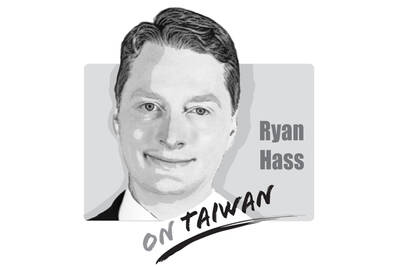Premier Cho Jung-tai (卓榮泰) at the end of last month approved the allocation of a record NT$647 billion (US$20.42 billion), about 2.5 percent of GDP, for defense spending for fiscal year 2025. The premier also approved a submarine development project to build seven vessels from next year to 2038, which is estimated to cost NT$284 billion.
While the legislature’s Procedure Committee on Tuesday voted against scheduling a debate on the budget, opposition legislators said the reason was due to items omitted by the Cabinet, such as increasing logging compensation for indigenous people. However, the submarine program was not raised as an objection.
Once the budget does reach the Procedure Committee, legislators are expected to hotly debate funding the program, as the Chinese Nationalist Party (KMT) and the Taiwan People’s Party have signaled significant reservations about supporting the project due to its projected timeline for completion, costs and appropriateness for the nation’s defense strategy.
Opposition lawmakers, such as KMT Legislator Ma Wen-chun (馬文君), have said that while they are willing to support defense spending increases, the submarine program needs further scrutiny. The government is seeking budget approval for seven additional submarines, even though the Hai Kun (海鯤), or “Narwhal,” which is the prototype the other models would be based on, is still undergoing sea tests and would not be delivered until November next year.
However, the government said it is seeking long-term funding for the project to ensure stability so contractors would commit to the project, adding that legislators who are threatening to vote down the program threaten its long-term viability.
The ministry “seeks to provide certainty and signals that the plan would not change regardless of developments at the Legislative Yuan or political circumstances,” said Lin Ying-yu (林穎佑), an assistant professor of international affairs and strategic studies at Tamkang University.
However, legislators such as Ma have also questioned the strategic soundness of committing so much money to procure an outdated, symmetric technology when asymmetric and more agile platforms such as uncrewed systems might be more effective in defending the nation.
This is a view shared by many defense analysts.
Taiwan should learn lessons from Ukraine’s fight against Russia and build an “anti-navy,” Jared McKinney and Reiss Oltman said in a recent opinion article for Nikkei Asia.
Ukraine has succeeded in destroying much of Russia’s vaunted Black Sea fleet “without a submarine and at a cost of much less than US$8 billion” through a “mosquito fleet” of asymmetric platforms, such B-2 drones, Neptune anti-ship missiles, Harpoon anti-ship missiles and uncrewed submarine vehicles, they said.
Taiwan’s money would be better spent in funding thousands of smaller platforms, creating a “decentered force” that could be procured quickly, rather than a handful of vulnerable symmetric platforms that are not scheduled to be ready until the end of the next decade, they added.
However, defense experts such as Institute for National Defense and Security Research fellow Su Tzu-yun (蘇紫雲) still say the submarine program would be an important addition to the nation’s defense capabilities, especially in shutting off the Bashi Strait or Miyako Strait and preventing enemy aircraft carriers from encircling Taiwan in the event of an attack. The submarines could also be used to break through a blockade.
It remains to be seen if the budget is passed or in what form, but so long as criticisms are made in good faith and discussions set aside partisan politics, with the national interest and strategic clarity firmly in mind, debate over the submarine program is an example of a healthy democracy at work.
The diplomatic dispute between China and Japan over Japanese Prime Minister Sanae Takaichi’s comments in the Japanese Diet continues to escalate. In a letter to UN Secretary-General Antonio Guterres, China’s UN Ambassador Fu Cong (傅聰) wrote that, “if Japan dares to attempt an armed intervention in the cross-Strait situation, it would be an act of aggression.” There was no indication that Fu was aware of the irony implicit in the complaint. Until this point, Beijing had limited its remonstrations to diplomatic summonses and weaponization of economic levers, such as banning Japanese seafood imports, discouraging Chinese from traveling to Japan or issuing

There has been much catastrophizing in Taiwan recently about America becoming more unreliable as a bulwark against Chinese pressure. Some of this has been sparked by debates in Washington about whether the United States should defend Taiwan in event of conflict. There also were understandable anxieties about whether President Trump would sacrifice Taiwan’s interests for a trade deal when he sat down with President Xi (習近平) in late October. On top of that, Taiwan’s opposition political leaders have sought to score political points by attacking the Lai (賴清德) administration for mishandling relations with the United States. Part of this budding anxiety
The diplomatic spat between China and Japan over comments Japanese Prime Minister Sanae Takaichi made on Nov. 7 continues to worsen. Beijing is angry about Takaichi’s remarks that military force used against Taiwan by the Chinese People’s Liberation Army (PLA) could constitute a “survival-threatening situation” necessitating the involvement of the Japanese Self-Defense Forces. Rather than trying to reduce tensions, Beijing is looking to leverage the situation to its advantage in action and rhetoric. On Saturday last week, four armed China Coast Guard vessels sailed around the Japanese-controlled Diaoyutai Islands (釣魚台), known to Japan as the Senkakus. On Friday, in what
On Nov. 8, newly elected Chinese Nationalist Party (KMT) Chairwoman Cheng Li-wun (鄭麗文) and Vice Chairman Chi Lin-len (季麟連) attended a memorial for White Terror era victims, during which convicted Chinese Communist Party (CCP) spies such as Wu Shi (吳石) were also honored. Cheng’s participation in the ceremony, which she said was part of her efforts to promote cross-strait reconciliation, has trapped herself and her party into the KMT’s dark past, and risks putting the party back on its old disastrous road. Wu, a lieutenant general who was the Ministry of National Defense’s deputy chief of the general staff, was recruited